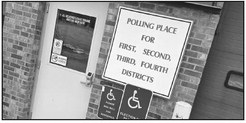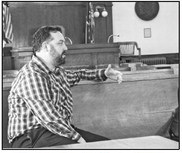Guidance needed for community events
No one wants to be the bad guy.
No one wants to be the one that says longtime community events cannot be held. No one wants to be the one that says people should still avoid traveling or being in large crowds. No one wants to tell people they have to figure out other ways to have fun.
In a normal year, summer weekends are packed with community events of every shape and size. Park shelters and pavilions around the region are kept hopping with parties, gatherings, reunions and other events. Halls and venues are booked months and sometimes a year or more in advance.
By any measure 2020 has not been a normal year. Safer at Home orders from the state gutted virtually all activities and events planned for the spring. Despite a court case overturning the orders and forcibly opening the state, there remain serious questions about safety, especially for at-risk populations and those who interact with at-risk individuals.
With the Safer at Home boogeyman effectively neutered by Madison politicians, those planning events for the summer have been left in a void. The advice for many is to follow the guidelines set out by the Wisconsin Economic Development Corporation (WEDC). These guidelines were developed by Gov. Tony Evers’ administration for a variety of businesses. While they are comprehensive and well thought out in addressing concerns related to things like taverns, workplaces and beauty salons, their guidance for those planning festivals and large gatherings is vague. Public health officials are equally as vague in providing specific guidance, partially because they have plenty of other things on their plates and partially for not wanting to be the ones to say an event cannot be held.
As it stands now, major area summertime events are standing like so many dominos waiting to see if one will be knocked over, leading to what will be a cascade of cancellations. Others are dealing with insurance companies and concerns on if their liability coverage will protect organizers in the nightmare scenario of someone ending up hospitalized or dying after contracting COVID-19 at their event.
At the same time, organizers are facing the questions if business sponsors, still reeling from shutdowns, can afford to be generous this year or even if the events are held will there be enough people showing up and spending money to cover the expenses.
In answer to these legitimate fears, organizers get platitudes about the need to be creative in dealing with changing situations. Some have been told to go ahead and plan as if everything will go on as normal but to be prepared in case the plug gets pulled at the last minute.
While creativity and flexibility are the hallmarks of any successful event, things can only go so far before hard choices need to be made. For many events, the next few weeks are critical ones that will determine what the coming summer looks like in the region.
No one wants to be the bad guy, but sometimes tough choices need to be made. Those making the choices must have the best guidance possible. Given the mobility of the population and the importance to the state’s tourism economy for these events, any direction should come from the legislature and be determined on a regional basis using sound public health science rather than emotion.




